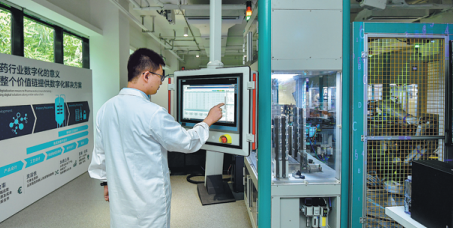Chengdu spearheads western China's science and technology industries
Benefiting from its solid technological foundation and innovative culture, Chengdu is becoming a leader in the development of science and technology in western China, local officials said.
The provincial capital of Sichuan has also been providing strong support for the Chengdu-Chongqing economic circle, which is the largest metropolitan area in western China.
Chengdu is home to 66 industrial zones and parks and has attracted large numbers of high-tech companies to set up branches and launch operations. Statistics from the city's science and technology bureau showed that Chengdu added 1,036 national high-tech companies in 2019 and generated more than 940 billion yuan ($142.79 billion) in revenue from the industry.
Beijing-based space technology startup Galactic Energy is one of the companies pushing forward the development of an aerospace industrial cluster in Chengdu.
On Nov 7, China's new carrier rocket Ceres 1, designed and built by Galactic Energy, made its maiden flight. It sent a small communication satellite that will provide internet-of-things service to clients into a sun synchronous orbit about 500 kilometers above Earth. The distance set a new height record for a private Chinese rocket.
The company is building a research and development base for next-generation commercial launch vehicles in Chengdu's aerospace industrial zone. The zone, covering 168.5 square kilometers, aims to become one of the leading commercial aerospace industrial centers in China.
"The zone has a complete industrial development plan, which is very attractive to commercial aerospace startups," said Liu Baiqi, founder and CEO of Galactic Energy.
The zone has set up four industry incubation projects and six other projects to speed up industrial development.
In addition to Galactic Energy, it has also introduced Sichuan Academy of Aerospace Technology, CETC Spaceon and Beijing Star Time Telecommunications Technology. A civil-military integration high-tech industrial base built by the Sichuan academy has been put into use. Star Time has been granted by Hungary the first license for a Chinese company in internet live broadcasts and radio and television broadcasts.
The aerospace industrial zone will set up an aerospace technology innovation factory, aiming to boost mass production of China's key technological products within five years.
Chengdu has also made remarkable achievements in the sector of biomedicine.
HitGen, a local biomedicine company, was listed on the science and technology innovation board at the Shanghai Stock Exchange on April 16. It is the first company in Southwest China to appear on the board.
Chengdu Tianfu International Bio-Town, where HitGen is located, is rapidly developing into a world-class bio-industry park. It has hosted 150 projects and attracted five Nobel Prize laureate teams, four academician teams and 51 high-caliber talent teams.
Another innovative entrepreneurship landmark in Tianfu New Area is Chengdu Science Town, which is also a core part of Chengdu and Chongqing's joint development plan for Western Science City.
The sixth meeting of the Central Finance Committee, held earlier this year, emphasized the need to promote the development of the Chengdu-Chongqing economic circle and make the region a nationally influential center for technological innovation. Western Science City is an important part of the effort.
Chengdu Science Town is 29 km south of the city's downtown area, with a planned area of 99.4 sq km. It has gathered a large number of major innovation platforms, research institutes and cutting-edge science and technology enterprises.
On Nov 24, the Chengdu Innovation Institute of Beihang University became operational. It has been the largest learning, research and production platform in Sichuan, and focuses on helping the R&D of Beihang teams in turning their research results into production.
The Chengdu branch of the Chinese Academy of Sciences in the science town and the Chengdu College of the University of CAS are also under construction.
The former is expected to be operational this year. By then, the town will be home to the CAS Chengdu branch, as well as its affiliated Chengdu Institute of Biology, Chengdu Institute of Mountain Hazards and Environment, Chengdu Literature and Information Center, and two affiliated companies-Chengdu Organic Chemicals and Chengdu Information Technology of CAS.
The Chengdu College of the University of CAS plans to use 17.3 hectares of land and set aside 11 hectares for major research platforms of CAS. It is expected to be completed and put into use in 2022, and have 1,500 students by 2025.
Chengdu Science Town also boasts a supercomputing center, which finished its first phase of system installation and testing before beginning trial operations in September. The facility is currently applying for a State-level supercomputing center, endeavoring to fill the gap in China's supercomputing system across the western region.
An official at the administrative committee of Chengdu Science Town said new industries such as artificial intelligence, big data, animation and design are rapidly developing in Chengdu. The fast development has created a huge demand for supercomputing. The center will help accelerate the cultivation of these industrial ecosystems by providing important service support. Moreover, 64 universities and more than 30 research institutions nationwide have their research programs closely related to supercomputing.
The science town has attracted 11 major scientific and technological infrastructure projects, 17 national innovation platforms funded by institution like CAS the National Agricultural Science Center and 41 projects run under the joint efforts of research institutes, universities and local administrations.
Chengdu is expected to offer a base for the State-level technology innovation center for the Sichuan-Tibet Railway. With an estimated investment of 9 billion yuan, the center will use the advantageous resources of China Railway Group and related companies and institutions to conduct research on building railways in and developing equipment for complicated environments like high-altitude plateaus and mountains.

Chengdu Science Town has gathered a great number of tech companies and research facilities. [Photo/provided to China Daily]

A researcher works at a medicine lab in Chendu Tianfu International Bio-Town. [Photo/provided to China Daily]

An engineer works at Siemens' smart manufacturing innovation center in Chengdu. [Photo/provided to China Daily]



